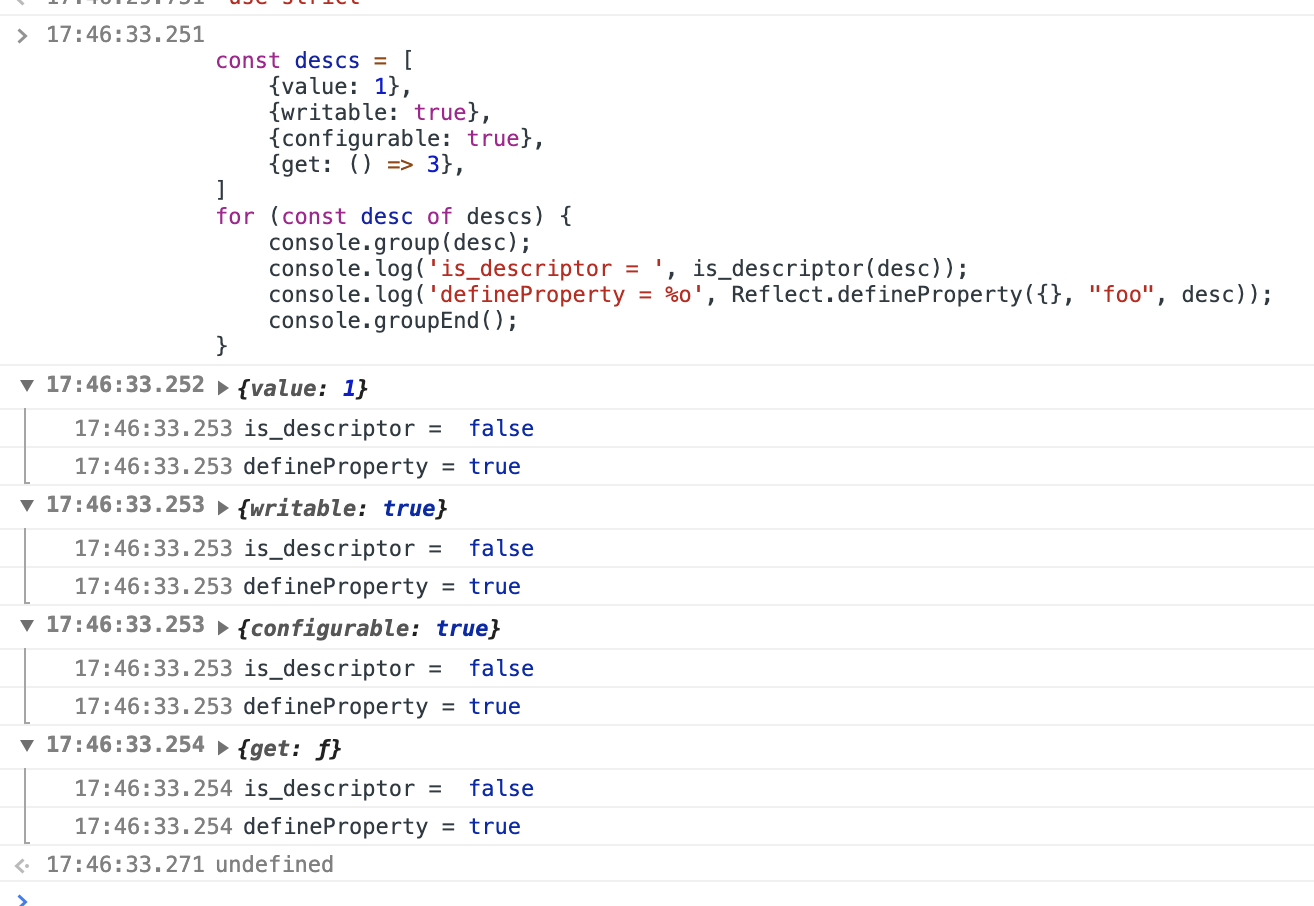Returns true if a value has the characteristics of a valid JavaScript descriptor. Works for fully completed data descriptors and accessor descriptors.
const isDescriptor = require('is-descriptor');
const assert = require('assert');
const defaults = { configurable: false, enumerable: false };
const dataDefaults = { ...defaults, writable: false};
assert.ok(isDescriptor({ ...dataDefaults, value: 'foo' }));
assert.ok(isDescriptor({ ...defaults, get() {}, set() {} }));
assert.ok(!isDescriptor({ ...defaults, get: 'foo', set() {} }));You may also check for a descriptor by passing an object as the first argument and property name (string) as the second argument.
const obj = { foo: 'abc' };
Object.defineProperty(obj, 'bar', { value: 'xyz' });
Reflect.defineProperty(obj, 'baz', { value: 'xyz' });
assert.equal(isDescriptor(obj, 'foo'), true);
assert.equal(isDescriptor(obj, 'bar'), true);
assert.equal(isDescriptor(obj, 'baz'), true);Returns false when not an object
assert.equal(isDescriptor('a'), false);
assert.equal(isDescriptor(null), false);
assert.equal(isDescriptor([]), false);Returns true when the object has valid properties with valid values.
assert.equal(isDescriptor({ ...dataDefaults, value: 'foo' }), true);
assert.equal(isDescriptor({ ...dataDefaults, value() {} }), true);Returns false when the object has invalid properties
assert.equal(isDescriptor({ ...dataDefaults, value: 'foo', bar: 'baz' }), false);
assert.equal(isDescriptor({ ...dataDefaults, value: 'foo', bar: 'baz' }), false);
assert.equal(isDescriptor({ ...dataDefaults, value: 'foo', enumerable: 'baz' }), false);
assert.equal(isDescriptor({ ...dataDefaults, value: 'foo', configurable: 'baz' }), false);
assert.equal(isDescriptor({ ...dataDefaults, value: 'foo', get() {} }), false);
assert.equal(isDescriptor({ ...dataDefaults, get() {}, value() {} }), false);false when a value is not the correct type
assert.equal(isDescriptor({ ...dataDefaults, value: 'foo', enumerable: 'foo' }), false);
assert.equal(isDescriptor({ ...dataDefaults, value: 'foo', configurable: 'foo' }), false);
assert.equal(isDescriptor({ ...dataDefaults, value: 'foo', writable: 'foo' }), false);true when the object has valid properties with valid values.
assert.equal(isDescriptor({ ...defaults, get() {}, set() {} }), true);
assert.equal(isDescriptor({ ...defaults, get() {} }), true);
assert.equal(isDescriptor({ ...defaults, set() {} }), true);false when the object has invalid properties
assert.equal(isDescriptor({ ...defaults, get() {}, set() {}, bar: 'baz' }), false);
assert.equal(isDescriptor({ ...defaults, get() {}, set() {}, enumerable: 'baz' }), false);
assert.equal(isDescriptor({ ...defaults, get() {}, writable: true }), false);
assert.equal(isDescriptor({ ...defaults, get() {}, value: true }), false);Returns false when an accessor is not a function
assert.equal(isDescriptor({ ...defaults, get() {}, set: 'baz' }), false);
assert.equal(isDescriptor({ ...defaults, get: 'foo', set() {} }), false);
assert.equal(isDescriptor({ ...defaults, get: 'foo', bar: 'baz' }), false);
assert.equal(isDescriptor({ ...defaults, get: 'foo', set: 'baz' }), false);Returns false when a value is not the correct type
assert.equal(isDescriptor({ ...defaults, get() {}, set() {}, enumerable: 'foo' }), false);
assert.equal(isDescriptor({ ...defaults, set() {}, configurable: 'foo' }), false);
assert.equal(isDescriptor({ ...defaults, get() {}, configurable: 'foo' }), false);You might also be interested in these projects:
- is-accessor-descriptor: Returns true if a value has the characteristics of a valid JavaScript accessor descriptor.
- is-data-descriptor: Returns true if a value has the characteristics of a valid JavaScript data descriptor.
- is-object: Returns true if the value is an object and not an array or null.
Simply clone the repo, npm install, and run npm test





